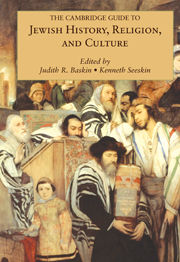Book contents
- Frontmatter
- Contents
- List of Figures and Tables
- List of Maps
- Contributors
- Acknowledgments
- The Cambridge Guide to Jewish History, Religion, and Culture
- Introduction
- 1 The Hebrew Bible and the Early History of Israel
- 2 The Second Temple Period
- 3 The Rabbinic Movement
- 4 The Jewish Experience in the Muslim World
- 5 Jewish Life in Western Christendom
- 6 Jews and Judaism in Early Modern Europe
- 7 European Jewry: 1800–1933
- 8 Jews and Judaism in the United States
- 9 The Shoah and Its Legacies
- 10 The Founding of Modern Israel and the Arab–Israeli Conflict
- 11 Judaism as a Religious System
- 12 The Centrality of Talmud
- 13 Jewish Worship and Liturgy
- 14 Jewish Private Life: Gender, Marriage, and the Lives of Women
- 15 Jewish Philosophy
- 16 Jewish Mysticism
- 17 Modern Jewish Thought
- 18 Contemporary Forms of Judaism
- 19 Jewish Popular Culture
- 20 Aspects of Israeli Society
- 21 The Future of World Jewish Communities
- Glossary
- Timeline
- Index
- References
2 - The Second Temple Period
Published online by Cambridge University Press: 05 May 2015
- Frontmatter
- Contents
- List of Figures and Tables
- List of Maps
- Contributors
- Acknowledgments
- The Cambridge Guide to Jewish History, Religion, and Culture
- Introduction
- 1 The Hebrew Bible and the Early History of Israel
- 2 The Second Temple Period
- 3 The Rabbinic Movement
- 4 The Jewish Experience in the Muslim World
- 5 Jewish Life in Western Christendom
- 6 Jews and Judaism in Early Modern Europe
- 7 European Jewry: 1800–1933
- 8 Jews and Judaism in the United States
- 9 The Shoah and Its Legacies
- 10 The Founding of Modern Israel and the Arab–Israeli Conflict
- 11 Judaism as a Religious System
- 12 The Centrality of Talmud
- 13 Jewish Worship and Liturgy
- 14 Jewish Private Life: Gender, Marriage, and the Lives of Women
- 15 Jewish Philosophy
- 16 Jewish Mysticism
- 17 Modern Jewish Thought
- 18 Contemporary Forms of Judaism
- 19 Jewish Popular Culture
- 20 Aspects of Israeli Society
- 21 The Future of World Jewish Communities
- Glossary
- Timeline
- Index
- References
Summary
When Cyrus, the ruler of Persia, conquered Babylon in 539 bce, the exiled Israelites living there saw him as a redeemer empowered by God. The book of Ezra, which recorded the permission of the Persian government to construct a new Jerusalem Temple to YHWH, portrayed Cyrus as if he too were a worshiper of YHWH:
In the first year of Cyrus, king of Persia, that the word of the Lord by the mouth of Jeremiah might be accomplished, the lord stirred up the spirit of Cyrus, king of Persia so that he made a proclamation throughout all his kingdom and also put in writing: “Thus says Cyrus king of Persia: ‘The lord, the God of heaven, has given me all the kingdoms of the earth, and he has charged me to build him a house at Jerusalem, which is in Judah. Whoever is among you of all his people, may his God be with him, and let him go to Jerusalem, which is in Judah, and rebuild the house of the lord, the God of Israel – he is the God who is in Jerusalem.’” (Ezra 1:1–2)
The author of Isaiah 45:1 was so convinced of the divine presence behind the events surrounding Cyrus's rise to power that he called Cyrus “the Messiah,” a leader anointed by God to fulfill a certain destiny; he believed that it was the destiny of Cyrus to return the people of Israel to their homeland and end the period of tribulation described in Isaiah 40:1–2.
- Type
- Chapter
- Information
- Publisher: Cambridge University PressPrint publication year: 2010

